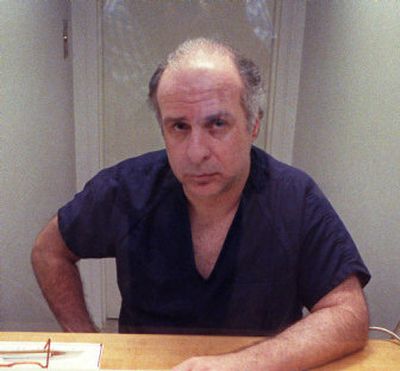Ex-mobster heads back to prison

Nicholas P. Mitola Jr. of Spokane was sentenced Tuesday to 15 years in federal prison – probably some of it in protective custody – for selling a firearm to a federal witness who says the former New Jersey mobster is a “one-man crime wave.”
Mitola was previously convicted for a 1991 killing in Spokane over a “drug scam gone sour” and involvement in 2000 in the largest, most-sophisticated bookmaking operation ever busted in the city.
“I admit I’m not the cleanest person, but I’m not a violent gun guy,” the bearded 58-year-old Mitola, wearing sandals and a blue jail jumpsuit, told Senior U.S. District Court Judge Frem Nielsen at the sentencing.
Mitola, a former federally protected witness, said thank you after Nielsen ruled that Mitola “accepted responsibility” for his latest criminal conduct and, therefore, qualified for the lightest possible sentence of 180 months.
“You don’t have to thank me,” the judge responded.
After his arrest two years ago, Mitola immediately confessed to the FBI and offered to “help burn this town down” by providing the agency with information about gambling, drugs and other criminal activity.
But the FBI, who used Mitola to infiltrate the Lucchese organized crime family in New Jersey in the late 1980s, turned down his offer.
A three-part series on Mitola and Al “The Penguin” Anglisano, the former federally protected witness who turned him in to authorities, concluded Tuesday in The Spokesman-Review.
When he’s released from prison, Mitola will be on federal supervision another five years. He will be banned from any form of gambling. He will be given credit for the 17 months he’s been in custody since his arrest in September 2004, two months after he sold a handgun to Anglisano, who was working for the FBI.
Anglisano, now out of the witness program and living under the name Perry Adrienne, didn’t attend the sentencing.
Two of Mitola’s associates, Lazarus Pertginides, who was arrested on state gambling charges in December, and Frank Ward, were in the courtroom but didn’t address the court. They were called “loyal friends” by Mitola during his remarks to the court.
Outside the courtroom, Pertginides and Ward both said while Mitola’s actions brokering a gun deal may have been “stupid,” he still got a bum rap from the FBI.
“In my opinion, the idea for the crime originated with the FBI. Without their involvement this crime would never have happened,” Ward said.
During the trial, tape recordings of conversations between Mitola and Anglisano were played for the jury, and Anglisano testified as a key prosecution witness. Mitola was found guilty of being a felon in possession of a firearm and ammunition last November.
Because of his two previous felony drug convictions and the 1991 manslaughter conviction in Spokane County, Mitola met the legal definition of an “armed career criminal” and faced a minimum of 15 years in prison.
Assistant U.S. Attorney Joseph Harrington argued to the court that by taking the case to trial, Mitola shouldn’t be given credit for accepting responsibility – a significant point-calculation issue when federal judges examine sentencing ranges under advisory guidelines.
The federal prosecutor urged the court to sentence Mitola to the “high end” of a sentencing range of 210 to 262 months – almost 22 years in prison.
Mitola told the court he still believes he was entrapped by the FBI and Anglisano, who was getting paid for his undercover work. “He hounded me for the gun,” the defendant told the judge.
Mitola said he got the gun for Anglisano because “I didn’t know if he was going to kill me and turn me in for a bounty” to Lucchese family members Mitola testified against in the longest organized crime trial in U.S. history. The trial ended with acquittals.
Harrington reminded the court that a 12-member jury rejected the defense’s entrapment theory after hearing witnesses and listening to Mitola testify in his own defense.
“He’s trying to shift the responsibility for his conduct,” the prosecutor told the court.
Mitola, who got the handgun from Tony Moss, could have simply introduced Anglisano to Moss and not played the middleman in the gun sale, Harrington said. But the ex-mobster wanted to play a role in the deal because “he wanted to stay in control of the situation,” Harrington told the court.
The prosecutor then re-read a portion of a secretly recorded FBI transcript of Mitola talking to Anglisano, used during the trial.
“I’ve got to do something for you first, ‘cause then we’re … we’re married,” Mitola told Anglisano in explaining why he’d get him the handgun. “That’s how I operate. Whatever you want done here, we’ll … we’ll go take a walk in the park.”
During its investigation, the FBI learned about other criminal activity Mitola was involved in, including insurance fraud and food stamp fraud in the Spokane area.
Court-appointed federal defender Terry Ryan told the court Mitola “essentially has led a lifetime of crime. But this crime he’s before the court for took place over the course of one minute.”
The defense attorney said statistics show older criminals like Mitola are less likely to re-offend and argued for the minimum 15-year term.
Harrington reminded the judge he heard those similar arguments before sentencing Mitola to two years in prison in 2000 for operating an illegal bookmaking operation.
“Here we are again, six years later, with new charges and a new conviction,” the prosecutor said.